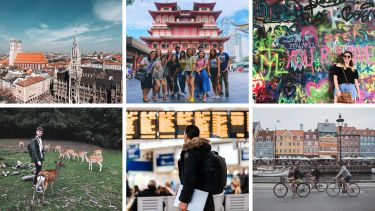Researching your options
These are some of the things you should consider when deciding if and where you want to study abroad. These are not the only things to consider, and you should make sure to research any and all aspects that may personally impact you.

On this page you can find relevant information about the things you should consider before deciding what destination is best for your study abroad plans.
- Can you afford to spend a year in that country?
-
- Living costs may be higher than in the UK (e.g. in Australia the minimum wage is higher) and experience shows students spend more on a year abroad compared to a year in Sheffield.
- Partner universities often have estimated living costs on their websites, though you may have to use the search tool to find it! Often it is in in the visa information section or the information for international or "out of state" students.
- Is health insurance required, and if so what can you expect to be charged? Host universities usually give an indication on their websites.
- Will a financial guarantee be required? If so, how will you prove you can afford to study abroad? You may not be able to use your Student Loan, or you may need bank statements with covering letters. Plan for this scenario - who will you ask for statements if you don't have savings in your name? Ask them about this now rather than later in case they need time to request statements.
- Check the visa requirements for your host country to check what forms of financial evidence are accepted, and to see what the costs of applying are. Will you have to travel to London for an interview? The Foreign, Commonwealth and Development Office living in country guides can help, and you should also refer to the local embassies for your host country. There is more about financial guarantees, tuition fees, Student Loans and scholarships on our website.
- See this BBC article on how to avoid large data roaming charges.
- Can you adapt to the academic and cultural differences?
-
- Even countries that have English as a first language will have a different culture to the UK. Ask returning study abroad students and they will confirm this!
- The academic culture can be very different in different institutions. For example, you may be continually assessed with attendance and class participation influencing your final grade. Some universities mark using the bell curve, meaning only the top students in a class get the top marks.
- How much flexibility do you have to take modules outside your subject area? For example, exchange students at the University of New South Wales must be prepared to take two electives in the August and January tailored terms.
- Some universities in Europe require you to have at least a basic level of understanding in the local language or may not teach in English. Check out Languages For All to prepare you.
- Consider local attitudes to age, race, disability, gender, religion, sexuality and gender identity.
- Laws can be different - check the legal drinking age (for example in the US the legal drinking age is 21).
- Some support services may not be offered in English, though you can still access University of Sheffield support remotely.
- Accommodation options
-
- You may not be guaranteed a room in university owned accommodation, and private renting may be expensive. Be prepared to start searching for accommodation well in advance.
- You may have to share a room with someone else (especially common in the US) and your room may come with a meal plan and no cooking facilities.
- Consider the distance you may have to travel from accommodation to lectures, and from accommodation to shops, etc. Rent prices may mean it's more affordable to live further from the university and commute in.
- Health
-
- Some hybrid teaching options may still be in place.
- Do you have any dietary requirements? For example it is very hard as a coeliac to eat a truly gluten-free diet in Singapore.
- If you have support needs (e.g. due to disability), please research whether the universities you are considering will be able to provide for those needs. Speak to DDSS who can provide you with advice: https://students.sheffield.ac.uk/disability
- If you need to take medicine regularly, talk to your GP about how you can access your medication while abroad. You won't be able to take a year's supply with you. For NHS advice see: https://www.nhs.uk/common-health-questions/medicines/can-i-take-my-medicine-abroad/
- Check if the visa process for your host country may involve medical expenses (e.g. chest x-rays are common for South Korea, Australia often asks for medical examinations for chronic conditions even if treatment is not required).
- Vaccination may be required to enter the host country and to register by the host university. Usually students requiring vaccinations to register in the US are offered them on campus, however if it is required to enter the country then you will still need to be vaccinated for travel.
- Other plans
-
- Do you want more time after your exchange for summer travel or an internship? Consider universities in Canada, or US universities where you attend for two quarters/terms (Drexel University and the University of Oregon) where your exchange will be complete in April.
- Do you have plans for the summer before the year abroad? Avoid universities in Australia and New Zealand that need you to travel there in mid-July for the start of term.
- Want to have the option to easily travel home, especially at Christmas? A European destination would be better for you, but also check out what your host university offers for international students over the holidays. There may be homestay options and your family might want to visit you abroad instead!
- Where to find out more
-
- Exchange students studying in your department
- Students who’ve studied abroad e.g. Global Opportunities Ambassadors (online chat available in term time).
- Tutors and lecturers who have experience of the destinations that interest you.
- Parents/relatives as you may need their support to go, and their financial assistance.
- Be sure to check the Related Information links at the bottom of the page for more information on your destination options and who your departmental contact is.
Additional resources for students
- Resources for BAME students
-
We have compiled the list of resources below to help Black, Asian and Other Minority Ethnic (BAME) students who are considering studying or working abroad during their studies to research their options.
- The Foreign, Commonwealth & Development Office (FCDO) offers advice on local laws and customs for 225 countries
- The BAME Staff Network at the University of Sheffield
- The BME Students Committee Facebook page
Articles and blogs
- Destination: France - arrival thoughts by Patrick Dapaah
- A Valencian Affair - Baron Ambas
- Travelling in Colour by Valentia
- Asfandyar Khan's Summer School In Japan
- Student stories: The reality of being a Muslim student in Australia by Siti Mokhsin
- A Summer School Experience in South Korea by Yussefa Sanyang
Blogs by US students
- Resources for LGBTQ+ students
-
We have compiled the list of resources below to help LGBT+ students who are considering studying or working abroad during their studies to research their options.
- The Foreign & Commonwealth Office (FCO) offers advice on local laws and customs for 225 countries, including specific advice for LGBTQ+ people
- Stonewall Global Briefings include details of local LGBT+ organisations, Prides, websites and other resources, broken down by region and by country. There is also Stonewall's website.
- Go Abroad.com has a downloadable LGBT+ "Guide to Study Abroad"
- Global Gayz has over 190 countries' worth of stories and advice for LGBT+ students
- The ILGA has maps for sexual orientation laws so you can easily check the situation in countries of interest
- NYU Student-to-Student Guide: LGBT (written by students)
- State-Sponsored Homophobia Report (published annually by ILGA)
- The LGBT+ Staff Network at the University of Sheffield (staff log in required)
- The LGBT+ Student Committee at the University of Sheffield
Articles and blogs
- Resources for students with support needs
-
We have compiled the list of resources below to help students with support needs who are considering studying or working abroad during their studies to research their options.
- Dyslexia and Disability Support Service
- The Foreign, Commonwealth & Development Office (FCDO) offers advice on local laws and customs for 225 countries, including specific advice for people with disabilities.
- The Disabled Students Committee Facebook page
- The Staff and Disability Network page.
Articles and blogs
- Mental health abroad
-
Resources
- Student Mental Health (student log in required)
- Togetherall (student log in required)
- Sheffield Talking Therapies (previously called IAPT)
- Counselling Service self help resources (student log in required)
- FCDO advice on travel and mental health
Blogs
- Be @travelaware - by Eleanor Ground
- Managing your mental health whilst studying abroad by Calsie Tyler
- The ups and downs of studying abroad
- Embracing Homesickness
- The Dreaded Homesickness: How I Coped and Overcame It
- How Not To Cope With Time Difference
- Making Friends During Your Year Abroad
- Making Friends Abroad

